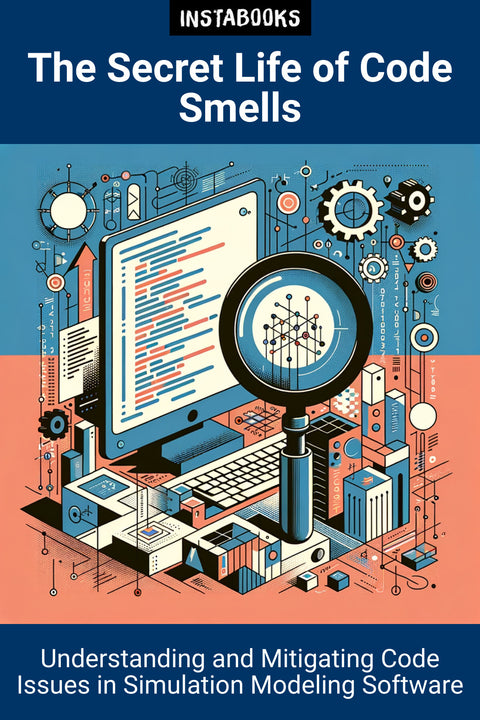
The Secret Life of Code Smells
Understanding and Mitigating Code Issues in Simulation Modeling Software
Included:
✓ 200+ Page AI-Generated Book
✓ ePub eBook File — read on Kindle & Apple Books
✓ PDF Print File (Easy Printing)
✓ Word DOCX File (Easy Editing)
✓ Hi-Res Print-Ready Book Cover (No Logo Watermark)
✓ Full Commercial Use Rights — keep 100% of royalties
✓ Publish under your own Author Name
✓ Sell on Amazon KDP, IngramSpark, Lulu, Blurb & Gumroad to millions of readers worldwide
Introduction to Code Smells in Simulation Modeling Software
In the intricate world of simulation modeling software, code smells represent a subtle yet pervasive threat. These design issues can affect the maintainability, quality, and performance of programs, often lurking beneath the surface where they might not be immediately apparent. With challenges unique to the vast and specific models such software demands, understanding and addressing code smells is crucial for developers aiming to optimize their systems.
The Prevalence and Evolution of Code Smells
Simulation modeling software frequently suffers from code smells such as 'Blob' where large classes exist, 'Spaghetti Code' with its tangled control structures, and 'Functional Decomposition' that sees classes designed for singular functions. Over time, these issues have evolved, challenging developers to recognize their impacts which might include technical debt, bugs, or an achingly difficult maintenance process. The evolution of code smell concepts, including the introduction of variability-aware code smells, helps illustrate the nuanced relationship between software design and its capacity for change.
Impact and Detection Techniques
The impact of code smells extends beyond the realm of design into real-world performance issues. These smells can lead to bugs, degrade performance, and complicate modifications. Various detection techniques have surfaced to aid developers, from Declarative Rule Specification and Machine Learning models to Feature Selection and Stacking Ensemble. Each method offers distinct advantages in recognizing and rectifying problem spots, fostering cleaner, more resilient code.
Refactoring Strategies for Lasting Solutions
Refactoring offers a redeeming solution to manage code smells effectively. Regular code reviews, the use of automated tools like Checkstyle and SonarQube, and applying principles of modularity and encapsulation form the backbone of proactive maintenance strategies. Understanding and leveraging these techniques ensures early identification and resolution of issues, fostering a sustainable development environment.
The Future of Code Smells: Quantum-Specific Concerns
While quantum-specific code smells are yet to be deeply explored, the established principles of code smell management extend to quantum systems as well. As complexity increases, particularly with quantum simulation models, variability-aware methods and machine learning techniques will undoubtedly play pivotal roles. By exploring these aspects, developers can make strides towards managing and improving code quality even in the most advanced technological frontiers.
Table of Contents
1. Understanding Code Smells- Defining Code Smells
- Historical Perspectives on Code Smells
- Common Code Smells in Simulation Modeling
2. The Prevalence of Code Smells
- Why Code Smells Matter
- Identifying Common Smells
- Impact on Software Quality
3. Evolution of Code Smells
- Adapting to New Challenges
- Variability-Aware Code Smells
- Emerging Trends in Software Design
4. Detection Techniques
- Declarative Rule Specification
- Machine Learning Approaches
- Feature Selection and Stacking Ensembles
5. Strategies and Solutions
- Regular Code Reviews
- Automated Detection Tools
- Refactoring Techniques
6. Machine Learning in Detection
- Leveraging AI Models
- Improving Detection Accuracy
- Integrating Tools with Development
7. Maintaining Code Quality
- Setting Quality Standards
- Performance and Maintainability
- Continuous Improvement
8. Refactoring for Clean Code
- Identifying Refactoring Needs
- Implementing Changes
- Measuring Refactoring Success
9. Modularity and Encapsulation
- Design Principles
- Preventing Code Smells
- Implementing Best Practices
10. Special Chapter: Quantum Simulations
- Quantum-Specific Challenges
- Adapting Code Smell Techniques
- Future Directions in Quantum Computing
11. Variability-Aware Approaches
- Understanding Variability in Code
- Catalog of Variability-Aware Smells
- Applying Techniques to Highly-Configurable Systems
12. Future Trends and Tools
- Anticipating Changes in Software Design
- Emerging Tools and Technologies
- The Future of Code Quality Assurance
Target Audience
This book is tailored for software developers, engineers, and researchers interested in improving code quality within simulation modeling and quantum computing environments.
Key Takeaways
- Understand the prevalence and evolution of code smells in simulation modeling software.
- Discover effective detection techniques including machine learning models.
- Learn refactoring strategies to enhance code quality and maintainability.
- Explore quantum-specific challenges and solutions in code smell management.
- Stay informed on the future trends and emerging tools in code quality assurance.
